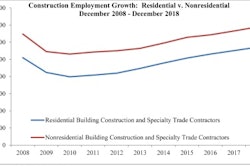
On Jan. 3, Nancy Pelosi (D-CA.) was elected speaker of the House for the 116th Congress with 220 votes, returning to a post she first held eight years ago. In a vote of 234-197, the House adopted Title I of its governing rules for the 116th Congress. The package includes dozens of changes important to the transportation construction industry, such as the repeal of the “Ryan Rule” on Highway Trust Fund (HTF) bailout transfers, the repeal of term limits for committee and subcommittee chairmen, and the formation of a rule that does not allow extra subcommittees for Transportation and Infrastructure (T&I) and the tax-writing House Ways & Means Committee. Also proposed is a budget enforcement change that will make it easier to fix the $7.6 billion highway funding recession scheduled to take effect July 2020.
Ryan Rule Repeal
Among the provisions that will not carry over into the new Congress is section 5110 of H. Con. Res 71, so called the "Ryan Rule." This provision requires that in the House, transfers of money from the General Fund (GF) of the Treasury to the HTF "shall be counted as new budget authority and outlays equal to the amount of the transfer of the fiscal year the transfer occurs."
Jeff Davis with Eno Transportation Weekly says that under budget score keeping law, and under Senate rules, transfers from the GF to the HTF fall into a kind of loophole and don't count as "real money."
"This means Congress is free to transfer, say, $100 trillion from the GF to the HTF and the only consequence would be a debt limit violation," Davis says. "The establishment of the Ryan rule, but then-Budget-chairman Paul Ryan (R-WI) in 2011 meant that GF to HTF transfers needed to be offset by spending cuts or revenue increases elsewhere in the budget. Now, such "pay-fors" for the next bailout, which will be necessary by 2020, will not be required by House or Senate rules."
One rule of H. Con. Res 71 that was retained in the mew rules package is section 5401 which allows the House to amend budget totals and allow consideration of any "bill or joint resolution or amendment thereto or conference report thereon, that invests in national infrastructure to the extent that such measure is deficit neutral for the total fiscal years 2018 through 2027."
PAYGO, not CUTGO.
When Republicans took over in 2011, they replaced the pay-as-you-go (PAYGO) budgeting provision in House rules with a “cut-as-you-go” provision (CUTGO).
"Essentially, PAYGO requires that new mandatory spending or tax cuts be fully offset with tax increases or mandatory spending cuts," Davis says. "CUTGO removed the ability to pay for increased mandatory spending with tax increases – only spending cuts were allowed as a pay-for. The PAYGO rule goes back to the status quo ante of 2010. But there is a particular transportation benefit to the rules change – PAYGO measures the fiscal effect of legislation in terms of the “net effect of increasing the deficit or reducing the surplus,” but CUTGO was only concerned with “the net effect of increasing mandatory spending.” What kind of net mandatory spending increase isn’t scored as directly increasing the deficit? Highway Trust Fund contract authority, that’s what. The House CUTGO rule effectively prevented any net increases in the total amount of HTF contract authority and posed a big obstacle to repealing the $7.6 billion rescission of said contract authority that is scheduled to take place per the FAST Act on July 1, 2020. Under CUTGO, a $7.6 billion spending cut would have been required in order to repeal the rescission. Under PAYGO, no spending cuts will be required in order to repeal the rescission."



















